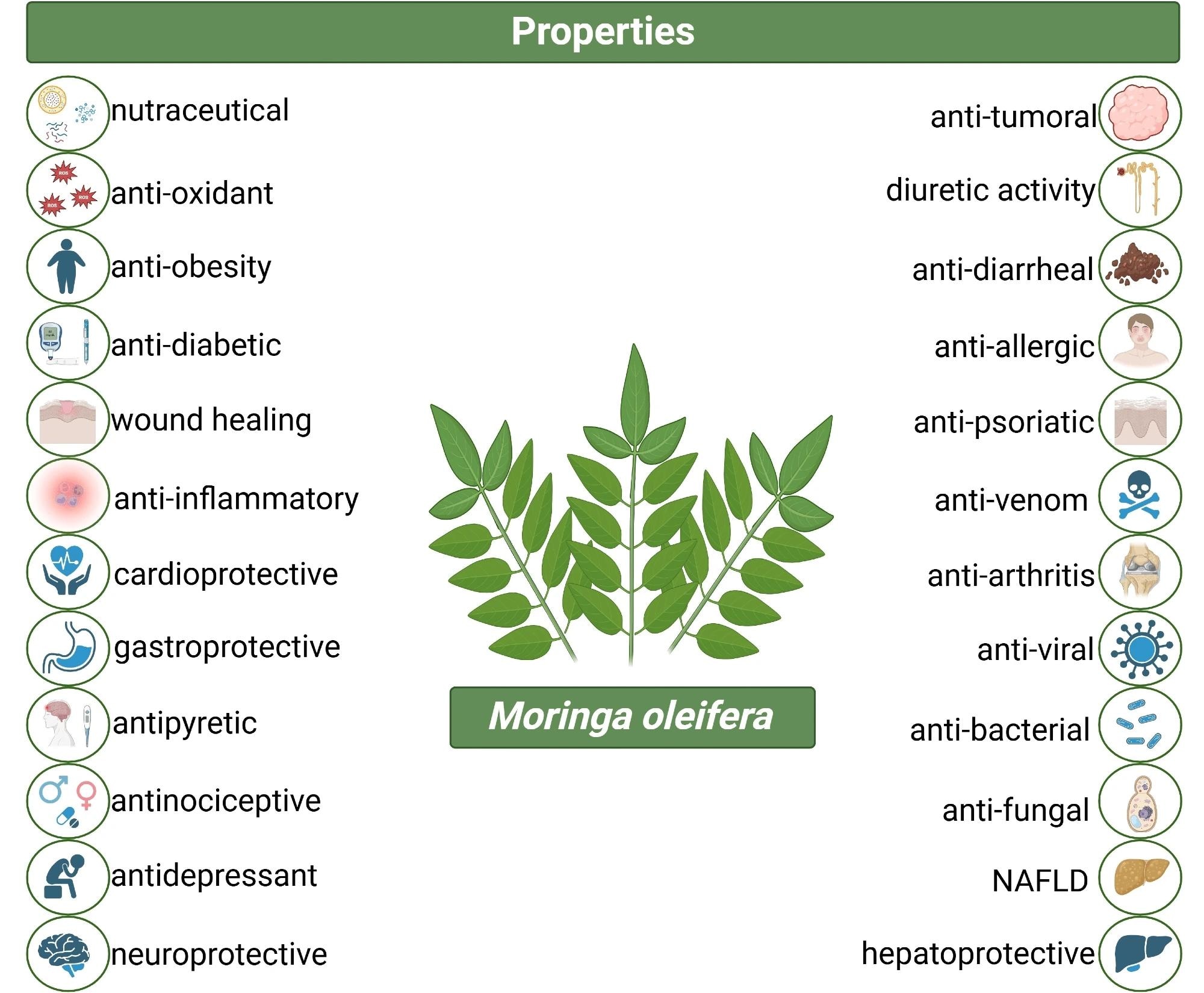Moringa oleifera may offer anti-inflammatory and antioxidant advantages, potentially supporting liver, cardiovascular, and skin health while helping to regulate blood pressure, cholesterol, and blood sugar levels.
Moringa oleifera is a sizeable tree originating from northern India with a long history in traditional herbal medicine that spans millennia. It is known by several common names, including the drumstick tree, horseradish tree, or ben oil tree.
Nearly every part of the tree — from the bark to the pods and leaves — is consumed or incorporated into traditional remedies.

Researchers have identified over 90 bioactive phytochemicals that may defend against oxidative damage, inflammation, fungi, and even cancer, among other potential benefits.
Below are six science-backed health effects associated with Moringa oleifera.
1. Moringa oleifera is highly nutritious
Moringa leaves supply a range of vitamins and minerals. One cup of fresh, chopped leaves (21 grams):
- Calories: 13
- Protein: 2 g
- Vitamin B6: 19% of the RDA
- Vitamin C: 12% of the RDA
- Iron: 11% of the RDA
- Riboflavin (B2): 11% of the RDA
- Vitamin A (from beta-carotene): 9% of the RDA
- Magnesium: 8% of the RDA
In Western markets, dried moringa leaves are commonly sold as supplements in powder or capsule forms.
Compared with the leaves, the pods generally contain fewer vitamins and minerals but are particularly rich in vitamin C. One cup of fresh, sliced pods (100 g) supplies a significant portion of your daily need.
In regions where diets may be deficient in vitamins, minerals, and protein, Moringa oleifera can serve as an important source of essential nutrients.
That said, moringa leaves can also contain substantial amounts of antinutrients like oxalates and phytates, which may hinder mineral and protein absorption.
Also note that taking moringa in capsule form is unlikely to provide large quantities of nutrients; the amounts are small compared with those obtained from a well-rounded whole-food diet.
2. Moringa oleifera is abundant in antioxidants
Antioxidants neutralize free radicals in the body.
An excess of free radicals can lead to oxidative stress, which is linked to chronic illnesses such as cardiovascular disease, diabetes, and cancer.
Moringa leaves contain many antioxidant phytochemicals, including flavonoids, phenolic compounds, carotenoids, and ascorbic acid, which have been identified in analyses of the plant.
Studies suggest the antioxidant constituents in Moringa oleifera could be particularly protective against oxidative damage from UV exposure, a factor in skin cancer development.
Certain flavonoids such as quercetin and myricetin may also aid blood pressure control, and oleic acid may contribute to lowering blood pressure as well.
3. Moringa may help reduce blood sugar
Elevated blood sugar increases the risk of several serious conditions, including diabetes and cardiovascular disease, so keeping glucose under control is important.
A 2020 review that included 7 human trials and 23 animal studies reported that Moringa oleifera reduced blood glucose levels — a key factor in diabetes management. In the human trials, powdered leaf supplements were primarily used.
These effects might stem from several plant constituents, such as quercetin, kaempferol, glucomoringin, chlorogenic acid, and isothiocyanates.
Despite encouraging findings, most evidence comes from animal research, so additional human studies are necessary to firmly establish moringa’s role in diabetes care.
4. Moringa oleifera may ease inflammation
Inflammation is the body’s response to injury or infection.
While it is a vital protective process, chronic inflammation can contribute to long-term diseases like heart disease and cancer.
Many whole plant foods — fruits, vegetables, herbs, and spices — have anti-inflammatory effects, but the degree of benefit depends on the types and levels of anti-inflammatory compounds they contain.
Several constituents in Moringa oleifera may exert anti-inflammatory activity, including:
- phenolic compounds
- alkaloids
- flavonoids
- carotenoids β-sitosterol
- vanillin
- moringin
A 2019 study reported that moringa leaves contained higher concentrations of anti-inflammatory and antioxidant compounds than the seeds and pods.
So far, most work has been limited to cell and animal experiments; more human research is needed to clarify moringa’s anti-inflammatory potential.
5. Moringa may reduce cholesterol
High cholesterol is linked to a greater risk of heart disease and stroke, according to the British Heart Foundation.
Evidence indicates that Moringa oleifera may possess antihyperlipidemic effects, potentially lowering cholesterol and triglyceride levels.
Some studies observed increases in HDL (the “good” cholesterol) and decreases in LDL (the “bad” cholesterol).
However, more human trials are required to better understand the extent of moringa’s lipid-lowering benefits.
6. Moringa oleifera may guard against arsenic toxicity
Arsenic contamination in food and water is an issue in many regions, and certain rice varieties can have particularly high arsenic levels.
Prolonged exposure to elevated arsenic can lead to health issues over time, including cancer, heart disease, and skin lesions.
Some animal experiments in fish and mice suggest moringa leaves may protect against certain effects of arsenic poisoning.
These findings are encouraging, but whether the same protective effects occur in humans remains unclear.
What are possible side effects of Moringa oleifera?
Moringa has a long history of traditional use for a variety of ailments.
Although adverse effects are rarely reported, a 2021 review warns that moringa may not be safe during pregnancy and could interact with medications for diabetes, blood pressure, and thyroid conditions.
If you have underlying health issues, consult a healthcare provider before taking Moringa oleifera. Also adhere to dosing instructions on supplement labels.
Frequently asked questions
Is it safe to take moringa every day?
Human long-term studies are limited. A 2022 review reported no observed adverse effects in humans so far. However, another review advises staying below 70 mg per day to avoid potential toxin accumulation.
How quickly does moringa start to have an effect?
Moringa’s effects may begin within 24 hours, but more research is necessary to determine the onset and the long-term benefits.
Can moringa help reduce belly fat?
Some animal studies found moringa reduced visceral and subcutaneous fat and overall body weight. However, human trials assessing moringa’s effect on weight loss or abdominal fat are lacking.
Who should avoid taking moringa?
Those who are pregnant or who take medications for diabetes, hypertension, or thyroid diseases should consult a physician before using moringa.
The bottom line
Moringa oleifera is an Asian tree with a long tradition in folk medicine.
Current research indicates moringa may modestly reduce blood sugar and cholesterol, offer antioxidant and anti-inflammatory effects, and provide some protection against arsenic toxicity.
Moringa leaves are nutrient-dense and can be beneficial for people who are deficient in essential nutrients.

























Leave a Reply
You must be logged in to post a comment.